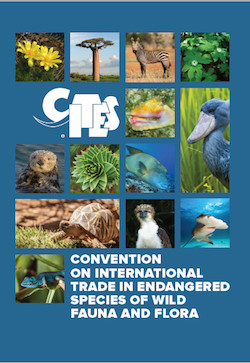CITES is the Convention on International Trade in Endangered Species of Wild Fauna and Flora. It’s an international agreement between governments whose aim is to “ensure that international trade in specimens of wild animals and plants does not threaten their survival”. It was formed in the 1970s, and today most (over 180) countries of the world are signatories to the agreement.
CITES has members from all around the world – and its responsibilities are global. The agreement gives this body not only a responsibility for the welfare of endangered species, but the authority to force meaningful change. Which brings us to their role in enabling the Taiji hunts.
We all know what takes place. Dolphins are taken from their ocean homes where they’ve been swimming free with their pods, off the Japanese coast. They’re pushed into the cove, which is netted off to trap them inside, either to be killed or sold. If the latter, they’ll be forcibly pulled from the water and put in tiny sea pens to begin a harsh process of acclimation to a life performing circus tricks in exchange for food. Once sold they’re packed into shipping containers and transported by air over thousands of kilometers.
They will then spend the rest of their lives confined to a chlorinated concrete pool, performing for their right to exist. Commodities for the use of another species, nothing more, nothing less.
This cruel injustice – the entire disgusting process – takes place under CITES’ auspices. In order for the transfer of Taiji dolphins to take place, this leading international conservation body needs to ignore these transfers. Now, a global petition argues that CITES could take action to stop them, and calls on this body to stop approving the transfers.
Is this a good tool to use to challenge the Taiji hunts? What if the hunters can make the case that the hunts are sustainable, from a conservation point of view?
Halting trade in endangered species is a great reason to oppose these hunts, but it’s also tremendously sad that we need to use this argument. Drive hunts are a case of one of the two primary intelligences on this planet routinely murdering the other one. You would think that should have settled the argument already.
Now I don’t wish to suggest that I am opposed to this approach. In fact I think it’s a good strategy, with a reasonably good chance of success. It ought to be tried. Stopping the approval of these transfers would be a big win.
What I want us to remember though, is what we’re really talking about here. OK, so conservation. All living things deserve respect for the inherent value they have with their very existence. That applies to everything that makes the biosphere tick. Go up the evolutionary ladder a little bit, and now you’re also talking about creatures capable of suffering, so you get into laws and norms designed to prevent cruelty. A survey of the broader natural world reveals to us a great many animals possessed of a surprising degree of intelligence, and thus capable of experiencing a considerable degree of harm from us. In the era of YouTube we’ve all witnessed a variety of animals who can and do put on impressive displays of intelligence and sensitivity. So there is that as well.
But the thing I want us to recognize is that even among this amazing panoply of creatures, dolphins clearly represent a special case. All well and good if we can end their being hunted because, after all, these hunts are in fact unsustainable. But the point is, even if there were tens of millions of dolphins – a truly inexhaustible “supply” of them – it would still be unconscionable to harvest them for our purposes.
Our respective intelligences evolved in very different environments, thus with very different requirements. They are not a tool making species like we are, and don’t possess the advantages of technology that lets them manipulate features of their environment. But our advantages don’t necessitate our holding superior rights. A dolphin’s cognitive skills, and obvious social intelligence, seems to be on a par with ours. We are very different, physiologically and technically, but I see nothing to establish moral superiority on our part. I don’t believe there is any conceivable way to build a case that we can treat them as commodities.
If enough of us were thinking about this clearly, the very idea of the Taiji drive hunts would be appalling and well beyond the pale. It wouldn’t matter how sustainable we believed these hunts to be.
It’s time to end this unsustainable, cruel, and – most importantly – unjust cycle of violence against dolphins.
For The Orca’s Voice,
Dani, Canadian Cetacean Alliance



Leave a Reply